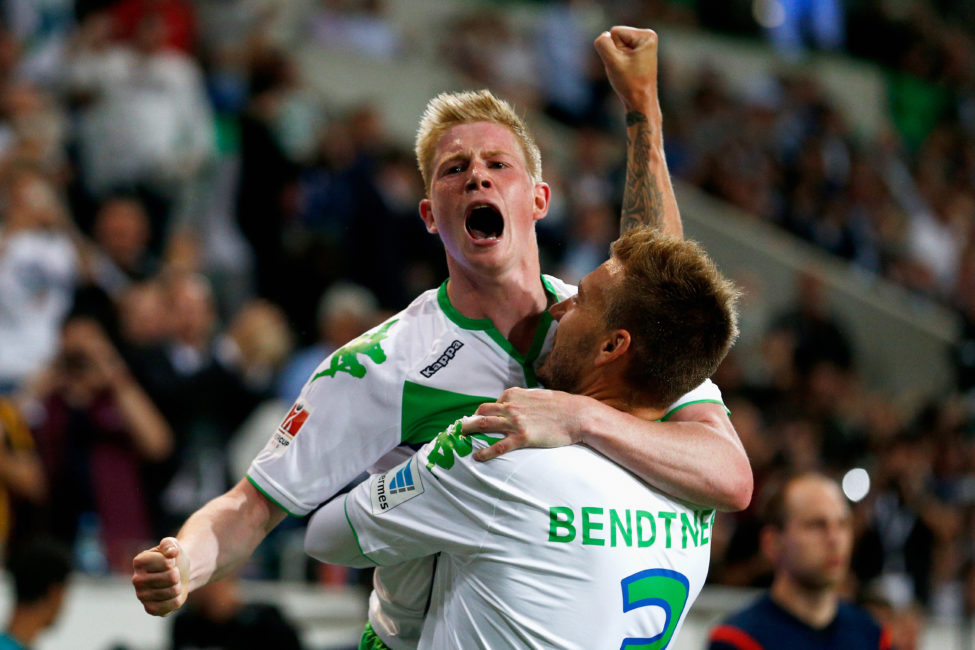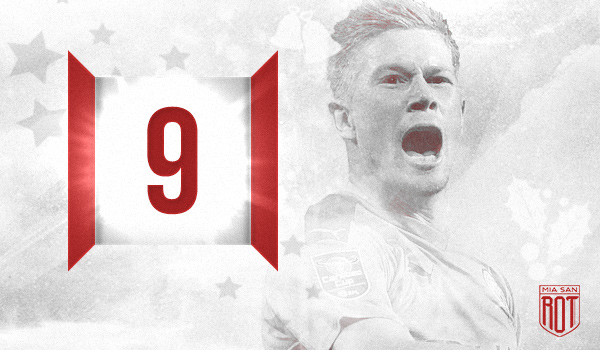The MSR advent calendar: Our favorite signings that never happened: Door 9 – Kevin de Bruyne
The situation of the player
At the peak of Bayern’s treble winning season on 23 February 2013, SV Werder Bremen lost 6-1 in the Allianz Arena. The only goal for the side from the north of Germany was scored by a 21-year-old Belgian, who took the league by storm that season: Kevin De Bruyne. The young offensive player, who was at Bremen on loan from Chelsea, celebrated his breakthrough and was directly involved in 19 goals for the club.
The following season, however, he was unable to make his mark at Stamford Bridge having returned from his loan spell, and so he returned to the Bundesliga in the winter of 2014, where his good reputation was still intact. At VfL Wolfsburg he became the team’s primary playmaker and the central figure in midfield. In the 14/15 season, he led Wolfsburg to second place in the league, setting a league record of 21 assists, which was only broken last season by Thomas Müller. Having also scored ten goals himself he also became a member of the illustrious club of players with 30 direct goal involvements in one season. In addition, he led Wolfsburg to victory in the DFB-Pokal, the second major title in the club’s history, and to the quarter-finals of the Europa League.
There is no question that in the summer of 2015 Kevin De Bruyne was one of the most sought after players on Europe’s transfer market after he had finally arrived in the top echelon of European football. He was a virtually complete package as an offensive player with first class distribution, excellent vision, a preternatural feeling for spaces, and a clinical finish. Add to that his robust physicality and two-footedness, and you had to look long and hard for a significant drawback.
The situation at the club
In the summer of 2015, FC Bayern were going into their third season under coach Pep Guardiola. The mood among the fans at the time was divided. Although the Spaniard had won the Bundesliga championship in both years, making it the fourth hat-trick in the club’s history, in the Champions League they had to concede defeat to a Spanish superiority in the semi-finals.

(Image: Dean Mouhtaropoulos/Bongarts/Getty Images)
Moreover, the squad was at the beginning of a phase of major turnaround. The two dominant players of past years, Arjen Robben and Franck Ribéry, were increasingly hampered by injuries, leader Bastian Schweinsteiger had left the club and Mario Götze, the erstwhile German wunderkind, had fallen short of expectations after his move to Bayern.
This was one of the reasons why Bayern’s bosses decided to open their purse for a number of major transfers. For the aging wide positions they signed Douglas Costa and Kingsley Coman, two potential heirs to the throne, and in midfield they were able to lure the Chilean fighter Arturo Vidal to the Isar. In addition, a promising young talent named Joshua Kimmich joined the club, apparently without any great chances of considerable game time.
The ‘what if’ outlook
Central offensive midfielders always have a hard time at Bayern, especially because of the quasi non-displacable Thomas Müller. But, like Marco Reus, De Bruyne would have benefited greatly from coach Pep Guardiola’s ability to build a perfect tactical framework around a player’s strengths.
One possible lineup would be an adaptation of what we often refer to as “death lineups”, a formation with four offensive midfielders flanked by the two wingers De Bruyne and Müller. The combination of these two very different types of players seems particularly promising. While De Bruyne would act as a link-up player and could provide dangerous incisive passes into the final third, Müller could act more freely and open up gaps in the opposing defense with unconventional runs.
The date is 3 May 2016 and the venue is once again the Allianz Arena. Three years after his first appearance in the air cushion near Fröttmaning, the German record champions meet the defensive bulwark Atlético Madrid in the Champions League semi-finals. Guardiola’s team runs for 90 minutes setting off an offensive firework to make up for the 1-0 defeat in the first leg. This is the moment of glory for Kevin De Bruyne. In the Bayern side’s early lead, he plays a pass into a space that perhaps three players in the world can even see, and Lewandowski scores in a stunningly clinical manner. A short time later the Belgian himself scores when he surprisingly appears in the penalty area in front of Oblak after Müller had previously opened the space for him with a diagonal run. Müller himself scores the final goal in a 3-0 win with a 25-metre missile straight into the top left corner.
Yes, with Kevin De Bruyne the triple victory in 2016 would have seemed within reach. For Bayern’s offensive game of these days he would have been just the right ingredient. Besides lifewires Costa and Coman, he could have been the necessary center of stability in midfield. Next to Ribéry and Robben, he would have been the agile, quick initiator. Next to Vidal and Müller, he could have been a more conventional playmaker and organizer in midfield. Next to Lewandowski he would have been the perfect assist provider.
Just over ten years earlier, FC Bayern could have signed a playmaker from a direct competitor. But like De Bruyne, this exceptional footballer also decided to go to the island. Who he was? Find out behind door number 10 tomorrow.





